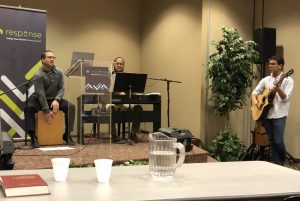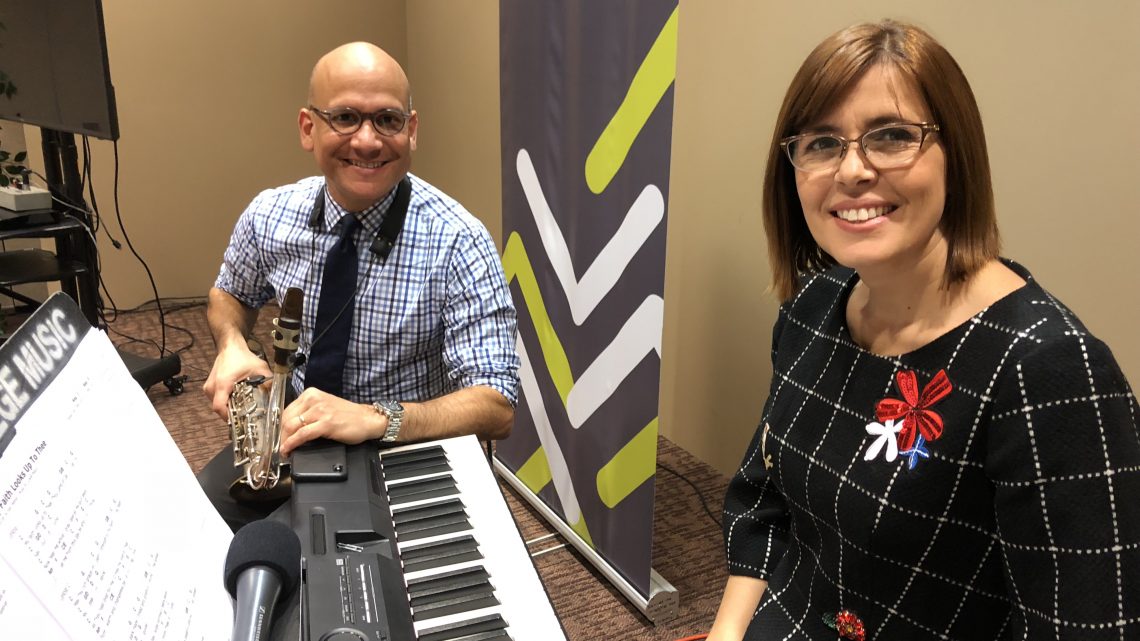The first Response Worship Summit, held Oct. 24-27 at the College View Seventh-day Adventist Church in Lincoln, Nebraska, aimed to go beyond a discussion surrounding genres of music and delve into scriptural foundations for worship.
The three-day summit included plenary sessions, practical break-out sessions, and times of group worship led by a team of internationally known Adventist presenters and musicians.
“The idea for a summit was born from the need to clarify what worship is, and what it should and could be,” said CVC’s lead pastor Harold Alomia in his opening remarks.
The Response Summit was co-organized by Pastor Alomia, associate CVC pastor for worship Deneil Clarke, and Tito Charneco, who pastors the Manhattan Adventist Church in New York City, and sponsored in part by the North America Division of Seventh-day Adventists.
Worship in the Bible
“The description of worship in Scripture is thick, multi-layered, multi-faceted and extremely rich,” stated Kessia Reyne Bennett, CVC’s pastor for discipleship, during the first plenary session.
“The Bible is our authoritative source for knowledge unto worship.”
Bennett added that “we should be careful lest we bring our selfish gifts to God and call it worship.”
During his plenary session, Pastor Charneco drew from his personal experience of studying worship and music in Scripture for the past 10 years. “It is what the Word of God says that matters,” said Charneco. “My opinion does not count.” Charneco focused on the most prominent musician in the Bible—David—and the lessons we can learn from his worship.
He proposed that instead of asking what kind of music is “acceptable” based on our culture, our preferences and our traditions, we should be asking What is the acceptable posture of the heart in worship? “When He saves us, our response is to use every fiber of our beings to honor and praise Him from a thankful heart,” Charneco stated.
Charneco’s conclusion was that it all boils down to the gospel: “Not understanding the gospel and being a [church] member, but not a disciple, is what fuels resistance to true worship.”
In a presentation titled Catching God’s Rhythm, Gerald Klingbeil, associate editor of Adventist Review and Adventist World magazines, suggested that connecting music to mission could “end the worship wars” in churches.
Focus is key
“Worship begins when we confess in our private lives the power of the Lamb—not our works—and the testimony of Jesus Christ,” stated Jonathan Leonardo, who has been speaking with the Love Reality Tour for the past two years. “Then the Lamb empowers us for eternal life in the holy city of the New Jerusalem,” Leonardo said during his exposition of worship in the book of Revelation.
Professor Adrianna Perera, who chairs the Music Department at Andrews University, added that “worship in spirit and truth must be born inside our souls to be honest and authentic.”
Perera also pointed out the benefits of musicians and theologians working together in preparing the atmosphere in which worship occurs. “Theology searches for ways to understand God and His truth. Music searches for ways to express emotions and beauty,” she said.
Where are the Adventist songwriters?
During her exploration of the history of worship in the Christian church, Perera pointed out how congregational singing was forbidden for more than 1,000 years during the Dark Ages. Eventually, the Reformation challenged the church’s traditions and ecclesiastical power. Simple melodies, harmonies and instruments were introduced gradually into congregational worship. Today’s modern hymnals include many songs written by Isaac Watts, John Wesley, Fanny Crosby and other pioneers of hymnody.
Early Adventists chose to sing songs that focused largely on the work to be done before the soon return of Jesus and what they understood as the impending final days of earth’s history.
In a question and answer session, the topic was raised of updating the North American Division’s Adventist hymnal to include newer songs, as has recently been done in the South American Division. One participant asked if songs currently being written and sung by contemporary Adventists would be included in an update of our hymnal.

Each registered participant attending the Response Worship Summit received the book More than Music: Worship by Dr. Adriana Perera.
Video recordings of the summit will be available on Adventist Learning Community at a later date.
Photos: Brenda Dickerson








